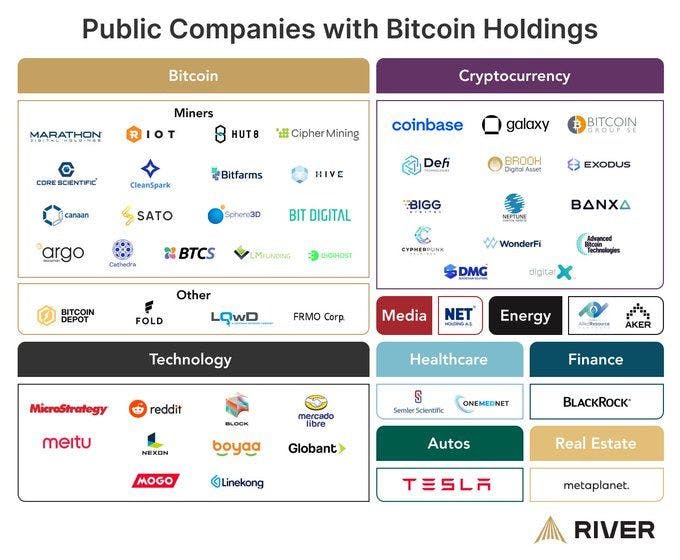
2024-9-19 07:55:24 Author: hackernoon.com(查看原文) 阅读量:1 收藏
Bitcoin is a unique monetary revolution that highlights the importance of decentralization in enabling humans to regain power over the fruits of their labor.
Beyond money, decentralization is the key to humans regaining power in all areas. This applies to your data, social networks, etc... All areas are impacted, and decentralization is the key to a future where you have access to total freedom of action and expression. Bitcoin is just the prelude to a wider movement.
The problem I and others have been seeing with Bitcoin for several months now is the rise of the financial giants in the Bitcoin world.
Behind BlackRock, these financial giants are gradually stealing the very meaning of the Bitcoin revolution. BlackRock has a secret plan to take total control, as I explained a few weeks ago.
BlackRock and the other financial giants are in the process of integrating Bitcoin into the current system as a simple SoV, whereas Bitcoin is intended to replace the current system. To do this, you need to think of Bitcoin as an MoE for everyday use.
This, too, is the clash of the years to come: Bitcoin as a SoV Vs. Bitcoin as an MoE.
While pseudo-Bitcoiners rejoice in everything that's currently happening because their only interest is to make ever more profit in weak money, you also need to open your eyes to another major risk for the future of the Bitcoin system.
This risk has only worsened since the approval of Bitcoin Spot ETFs in early 2024.
It involves the centralization of Bitcoin ownership within a single entity called Coinbase. Indeed, all the financial giants that have entered the Bitcoin world, except Fidelity, have delegated the management of their private keys to Coinbase. You may think I'm exaggerating to force the point, but when you see the figures, you'll realize the scale of the problem and the risk it poses to the Bitcoin revolution.
Coinbase currently holds 11% of the Bitcoin supply! You read that right, it's 11%, or to be more precise 10.83%, since Coinbase currently holds 2.27 million BTC.

This affects virtually every industry sector.
Coinbase holds 1 million BTC on its platform on behalf of its customers. If you're among those who leave their BTC on a centralized exchange like Coinbase, remember this rule:
Coinbase Prime Custody, which caters to institutional clients, secures 137,947 BTC, while its broader services manage a further 106,541 BTC through funds and OTC services. ETFs and ETPs hold over 808,000 BTC, and companies such as MicroStrategy and Tesla collectively hold over 99,000 BTC on Coinbase. Miners account for around 17,609 BTC.
This data highlights Coinbase's growing influence on BTC custody, raising potential centralization issues. You can see all this in detail on the previous diagram, but here's a short list summarizing the situation:
- Coinbase CEX: 1,105,318 BTC.
- ETFs/ETPs: 808,619 BTC (KPs: BlackRock (357,043 BTC for IBIT), Grayscale (225,607 BTC for GBTC + 31,833 BTC), ARK Invest (45,132 BTC), and others).
- Coinbase Prime Custody: 137,947 BTC.
- Funds/OTCs:106,541 BTC.
- Companies: 99,091 BTC (KPs: MicroStrategy (79,296 BTC), Tesla (11,509 BTC), SpaceX (8,285 BTC).
- Miners:17,609 BTC (KPs: Hut 8, CleanSpark, Cipher Mining, and Bitfarms).
What's most worrying here is that this trend is likely to grow in the future, as more and more companies in America decide to buy Bitcoin to replicate
Public companies holding Bitcoins have increased by 40% over the past year, and 52 of them have added BTC to their balance sheets:

When you see this list, you realize that the majority of these companies trust Coinbase and don't even make an effort to secure their BTC themselves. This proves that they don't understand the deeper meaning of the Bitcoin revolution or that they have no interest in it.
A few days ago, an FBI alert appeared explaining that North Korean hackers had been targeting the thousands of units of BTC held by American Bitcoin Spot ETFs for months. In practical terms, this means they are targeting Coinbase, where all these Bitcoins are centralized.
Now imagine the worst-case scenario - a hack of Coinbase. The entire Bitcoin industry would go into a depression of which you have no idea:
- All the Bitcoin held in ETFs would be gone.
- Much of the Bitcoin held by MicroStrategy would be gone.
- Bitcoin held by public companies would be lost.
- Bitcoin held by US mining companies would also be lost.
Compared to what would befall the industry, the collapse of FTX would be a laughing matter. Worse still, in my view, would be the risk of the end of the Bitcoin revolution. The total loss of confidence this would engender would run the risk of destroying the precious asset that we need to make the Bitcoin revolution flourish.
For your part, if you already have the private keys to your Bitcoin, there's not much more you can do, unfortunately. Like me, you'll have to accept this major risk in the hope that the Bitcoin revolution won't be destroyed by the centralization and opacity induced by Coinbase.
如有侵权请联系:admin#unsafe.sh